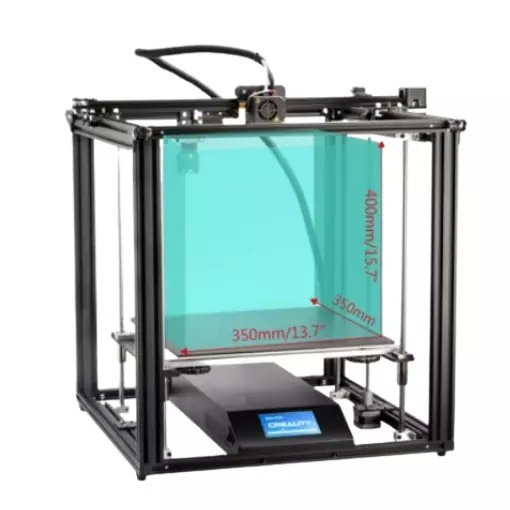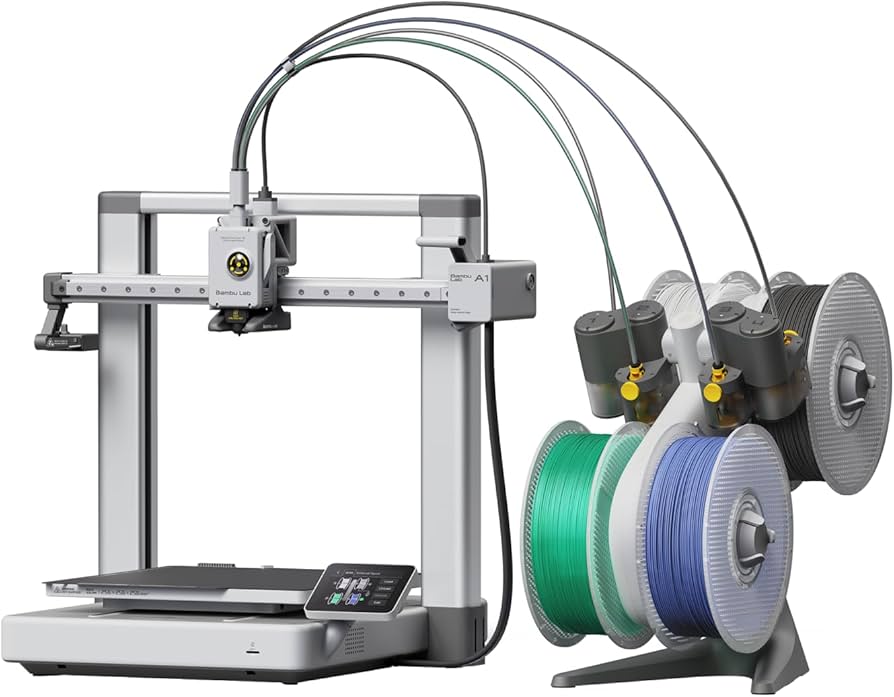Compare Ender 5 Plus vs A1
Comparison between the best 3D printers
Choose the best 3D printer at the best price. The cheapest 3D printers are here.
Buy a 3D printer here with 3D Fila.
 |
 |
|
| Model | Ender 5 Plus[BUY Ender 5 Plus] |
A1[BUY A1] |
| Printing Material | Filament | Filament |
| Buy Filament for Creality 3D Ender 5 Plus | Buy Filament forBambu Lab A1 | |
| Estimated price | $599,00 | $700,00 |
| Manufacturer | Creality 3D | Bambu Lab |
| Release Year | 2019 | 2023 |
| Print Volume [mm] | 350x350x400 | 256x256x256 |
| Printer Size [mm] | 632x619x666 | 385x410x430 |
| Weight [kg] | 18,2 | 8,3 |
| Power Loss Recovery | YES | YES |
| Enclosed printer | NO | NO |
| Bed Leveling | Automatic | Automatic |
| Filament End Sensor | YES | YES |
| Bed type | Heated | Heated |
| Power supply system | Bowden | Direct Drive |
| Standard nozzle | 0,4 | 0,4 |
| Maximum Nozzle Temperature [°C] | 260 | 300 |
| Maximum Bed Temperature [°C] | 100 | 100 |
| Maximum printing speed [mm/s] | 180 | 500 |
| Filament holder | YES | YES |
| Camera for supervision | NO | NO |
| Recommended filaments | PLA, TPU, ABS, PETG | PLA, PETG, TPU, PVA |
| Recommended slicers | Cura, Simplify, Slic3r | SuperSlicer, PrusaSlicer, Cura, OrcaSlicer |
| Maximum Resolution [mm] | 0,1 | 0,1 |
| Processor | 32 bits | |
| Display | Touchscreen TFT 4,3'' | Touchscreen 3,5 |
| Power Supply | 24V / 504W | 350 W |
| Connectivity | SD / USB | Wi-Fi, Bambu-Bus, Cartão Micro SD |
| Operating systems | Windows, Mac, Linux | Windows, Linux, Macbook |
| Date of registration in the system | 2021-04-14 | 2024-07-17 |
| Release date | 2019 | 2023 |
| Extra features | The Ender 5 Plus offers a large print volume (350x350x400 mm) and fast assembly. It includes a BLTouch sensor, but with range limitations. It stands out for its dimensional accuracy, although it requires adjustments to the slicer settings. Despite the noise, its integrated design saves space, and includes features such as a filament sensor and power resumption. Ideal for large projects, it requires refinement in the settings for high-quality prints. | The BambuLab A1 printer features fully automatic calibration, multi-color printing with the AMS system, active flow rate compensation, quick nozzle change with a clip, active motor noise cancellation, a build volume of 256x256x256 mm³, a maximum extruder temperature of 300°C, and a heated bed of up to 100°C. In addition, it has high precision, a machine health management system and an intuitive 3.5-inch touchscreen interface. |
| Support for multiple colors and materials (AMS and CFS) | NO | YES |
Notes * |
||
| Cost-benefit | 6 / 10 | 7 / 10 |
| Hardware | 2 / 10 | 4.2 / 10 |
| Tela | . | . |
| Print volume | 4 / 10 | 4 / 10 |
| Performance | 1 / 10 | 4 / 10 |
| [BUY Ender 5 Plus] | [BUY A1] |
Conclusion |
| In conclusion, both the Ender 5 Plus and the Bambu Lab A1 present unique advantages that cater to different user requirements and preferences. The Ender 5 Plus excels with its larger print volume and strong cost-effectiveness, which makes it a solid choice for those looking to tackle larger projects without a hefty investment. Its proven reliability and community support are considerable benefits, although it may require some finetuning to achieve high-quality results. On the other hand, the Bambu Lab A1 offers advanced features such as automatic calibration, high maximum nozzle temperature, and quick nozzle changes, which significantly enhance its usability and performance. Its superior printing speed and multi-color printing capabilities position it as an excellent option for users who want precision and efficiency in their projects, albeit at a higher price point. Ultimately, the decision comes down to user needs: if a larger build volume and value are priorities, the Ender 5 Plus is an appealing choice. Conversely, if advanced features and high-speed printing are more critical, the Bambu Lab A1 stands out as the preferable option despite its higher cost. Both printers have their strengths, making them suitable for various applications in the realm of 3D printing. |

